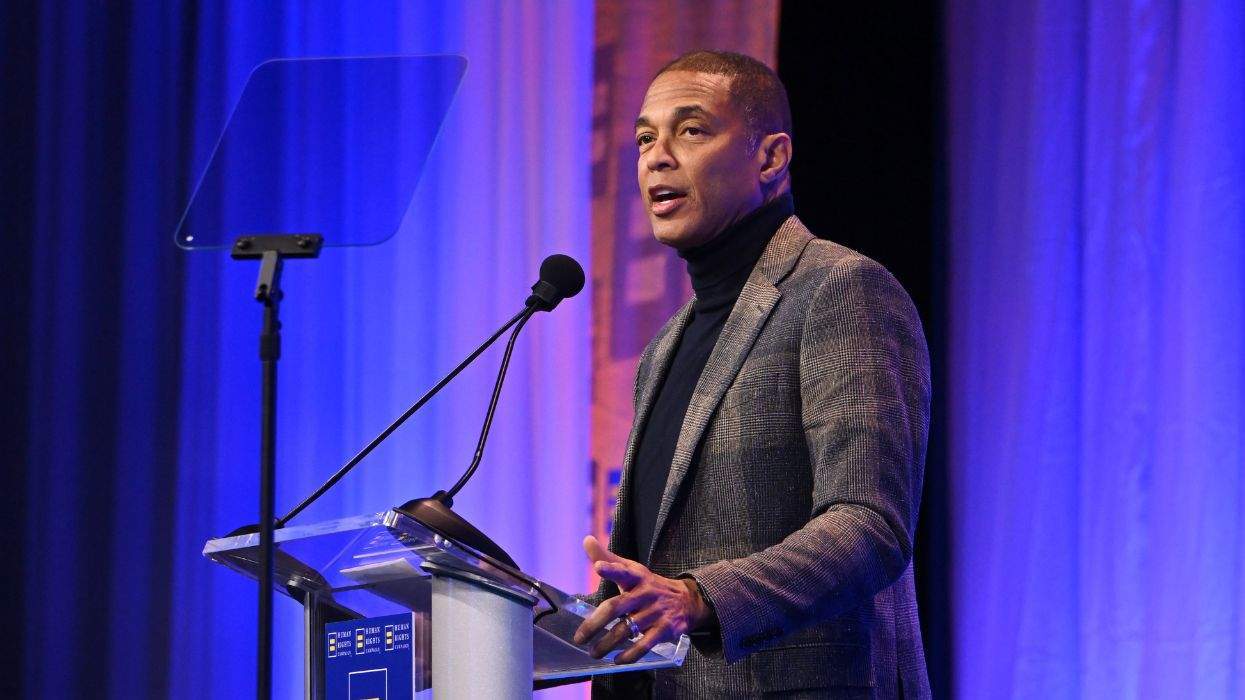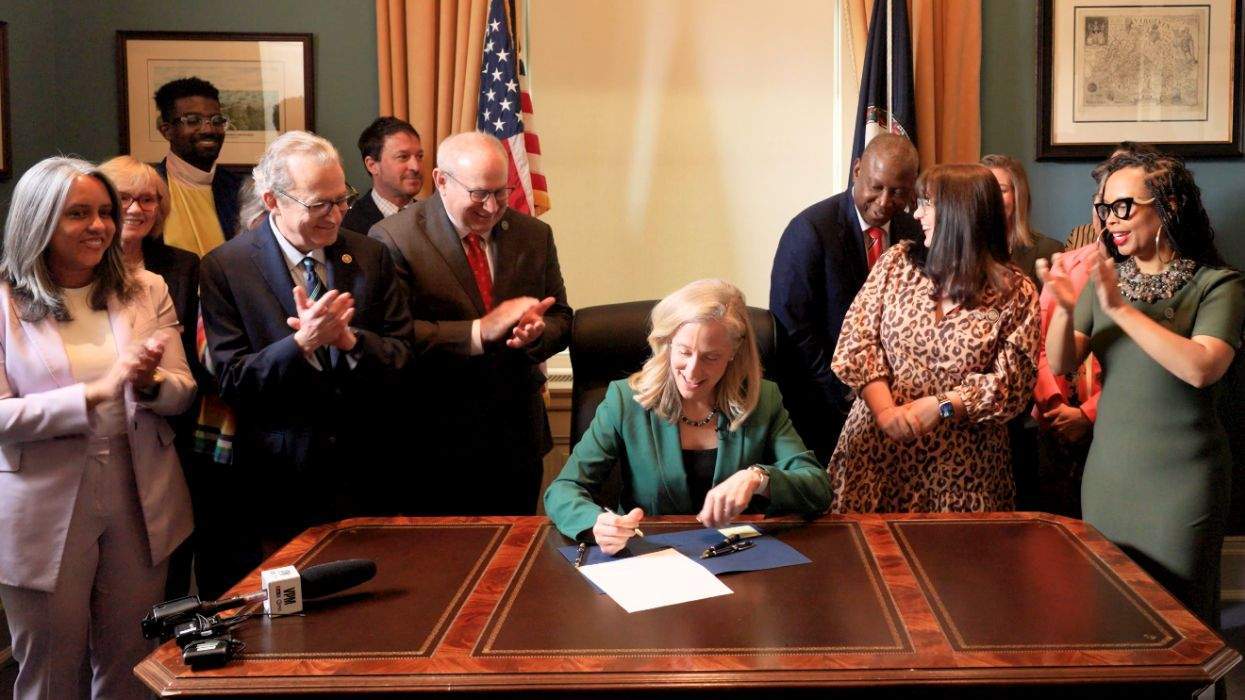The antigay bill in Arizona, which would have allowed business owners to discriminate against LGBT customers under the guise of religious freedom, is only one of a recent rash of similar measures that have been introduced in other states.
Kindred "license to discriminate" bills have been recently debated in Kansas, Georgia, Idaho, Maine, Mississippi, South Dakota, and Tennessee, and a more limited one was introduced in Indiana. Most have either failed or were effectively blocked within the past week. But conservative lawmakers are continuing to use religious freedom as an argument to deny rights to LGBT people.
In South Dakota, SB 128 was effectively killed by a Senate committee, which voted 5-2 to defer the bill to the day after the conclusion of the 40-day session, reports BuzzFeed. The bill specifically included sexual orientation in its text: "No person or entity may bring suit against another person for expressing their religious beliefs on the subject of sexual orientation."
In defense of SB 128, Sen. Jeff Munroe said the legislation would be used "for protecting against those who purposely choose an entity with whom they are unfamiliar, have no intention of actually ever doing business with, and bringing suit against them based on accusations protected by the Constitution."
"I don't think this is about protection," countered Sen. Mark Kirkeby. "It's a mean, nasty, hateful, vindictive bill. It just is. I cannot sugarcoat that."
A proposal in Kansas, HB 2453, extended "religious freedom" a step further to include not just business owners, but government employees. Although the Kansas House of Representatives passed the measure in a 72-49 vote last week, politicians said the legislation would not make it through the Senate in its current form. Senate president Susan Wagle told The Wichita Eagle last Thursday that she has "grown concerned about the practical impact of the bill," which would allow individuals, owners, and employees of both private businesses and government entities to refuse to provide wedding-related services if the wedding violates their religious beliefs.
"Senate leadership doesn't want anything to do with this, and I'm hoping their position is persuasive to the rest of the legislature," Kansas senator Jeff King told BuzzFeed, though he also stated that "nothing ever stays dead in this capitol."
Public outcry has played a major role in the suppression of bills in some states. Rep. Lynn Luker moved to pull legislation in Idaho after constituents raised concerns over the impact of expanded religious freedoms on LGBT residents. After the House voted unanimously to approve his motion, he said the revised bill would not appear again in this session.
Earlier this week, social media backlash also prompted the Indiana House of Representatives' Ways and Means Committee to remove a provision that would have allowed some state contractors to make hiring decisions based on their religious views. The provision could have allowed schools, colleges, and universities to refuse to hire or promote people who didn't adhere to the institutions' religious tenets -- for instance, LGBT people or members of other religions -- and maintain their contracts with the state.
"I didn't quite understand the firestorm it would create," said Rep. Eric Turner, the measure's author.
Similarly, the House of Representatives in Maine, where same-sex marriage is legal, rejected such a bill last Thursday by an 89-52 vote, two days after the State Senate voted it down as well. "It would give the ability to discriminate against anyone if it violates their religious beliefs," said Rep. Andrew McLean, who is gay.
Some lawmakers in favor of expanding religious freedoms are looking to federal law for precedent. Proponents in Georgia of HB 1023, or "The Preservation of Religious Freedom Act," cite to legislation passed by President Bill Clinton in 1993, which argues that the government must have a "compelling interest" to supersede an individual's religious freedom.
"We've got pretty good, strong constitutional provisions that address freedom of religion," Georgia House Judiciary Committee chair Wendell Willard told WABE, Atlanta's NPR affiliate. "I realize this is apparently coming as a result of some other states doing it and a federal statute that was brought in a number of years back, but I just want to wait and look at it and make sure we're doing the right thing."
Although the House bill, which could likewise be used to refuse services to LGBT customers, is effectively dead for the session, a similar bill, SB 377, was approved Friday by Georgia's Senate Judiciary Committee and may still be voted on by the full Senate by Monday, the deadline by which a bill must pass in at least one chamber to stay alive.
At least one state already has a law that permits anti-LGBT discrimination in the name of religion. Texas passed the Texas Religious Freedom Act in 1999, which prohibits government interference with the "free exercise of religion," defined as an act that is "substantially motivated by sincere religious beliefs," reports Texas LGBT news source Lone Star Q. The language of this act could be codified into the state's constitution if the so-called Religious Freedom Amendment, introduced last April by state senators Donna Campbell and Ken Paxton, passes.
Another state, Tennessee, withdrew its religious freedom bill after its sponsor, Sen. Mike Bell, consulted with legal experts and concluded that state law currently "protects our business owners from the type of lawsuit harassment we've seen in other states."
And "license to discriminate" bills continue to be proposed. Most recently, state senator Wayne Wallingford filed an analogous bill Monday in Missouri. He told The Kansas City Star that the intention was to protect the interests of businesses, such as florists and bakers, that might not wish to serve same-sex weddings.
"This is trying to provide a defense in those types of instances," he said. "We're trying to protect Missourians from attacks on their religious freedom."
And in Mississippi, the House Judiciary Committee is scheduled to discuss a so-called religious freedom bill Thursday morning. The State Senate passed it unanimously January 31. The Campaign for Southern Equality is urging citizens to contact their legislators and ask them to vote against the bill.
Eyes from both sides of the argument will surely be digesting today's decision from Arizona Gov. Jan Brewer, who vetoed her state's bill, SB 1062.















